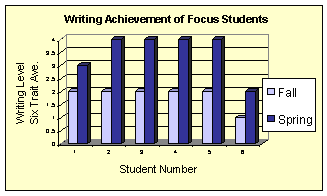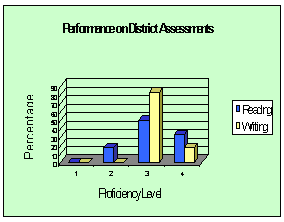Debra
Meredith, Lincoln Elementary, Riverton,
WY
NAVIGATING NONFICTION: THE IMPACT OF NONFICTION INSTRUCTION ON READING AND WRITING ACHIEVEMENT
| Problem |
Historically, students have been expected to learn-to-read in grades K – 3 and read-to-learn beginning in grade 4. Often these students have not had any experiences with nonfiction and lack the skills required to be successful in learning from nonfiction sources. Many distinguished educators have written material on the topic of teaching nonfiction strategies in the primary grades. A common thread weaves through these resources: nonfiction education must begin in the earliest grades in order to give children a fighting chance for understanding the genre as they mature. This research project was conducted to improve reading and writing in a third grade classroom at Lincoln Elementary School (K – 5) in Riverton, Wyoming by emphasizing nonfiction reading and writing strategies. |
| Research Questions |
How will the reading and writing achievement of third grade students be affected by the introduction of specific strategies for navigating nonfiction? |
| Methods |
A review of the literature revealed specific age-appropriate strategies for using nonfiction. Based primarily on the work of Stephanie Harvey (1998) and Linda Hoyt (2000) the following strategies were implemented: word sorts, very important points, marking text with sticky notes, retelling, paraphrasing using key words, red-hot research centers, and questioning. These strategies were implemented primarily in small groups of students at varying levels of proficiency with reading and writing. At first support was provided until students internalized the strategies and were able to use them more independently.
Performance data were collected for six students, roughly one-third of the class population. Two students’ reading and writing skills began slightly above grade level, two students showed average achievement, and two students were below grade level. Data sources included:·
- Classroom observations on the implementation of nonfiction strategies in the
classroom;
- Pre and post writing samples evaluated with a six trait
model;
- Pre and post reading levels attained from the Developmental Reading Assessment and the John’s Basic Reading Inventory;
- Student work during a red-hot research center; and
- Performance on related district reading and writing assessments.
|
| Findings |
- Increases were evident in both reading level and writing achievement in all six students.


- Student performance on district standards was compared as well as observations made in the classroom. Most students performed in the proficient (3) or advanced levels (4) in both reading and writing, while one student was partially proficient (2) in the area of reading.

- For these third grade students, the nonfiction strategies that were implemented had a positive effect on their reading and writing skills. Continued use of these strategies may likely affect another group of third grade students positively.
- The skills students developed; questioning, identifying key points, rephrasing information, should carry on into upper grades and greatly assist them with reading-to-learn.
|
| Policy
Recommendations |
- Provide elementary students experience with the genre of nonfiction at an early age.
- Incorporate nonfiction strategies with WELL, ExLL (literacy programs in Riverton schools), or other district literacy
programs.
- Include nonfiction strategies in staff development next year.
- Encourage teachers in early grades to use more
nonfiction.
- Build a high quality nonfiction library in the literacy center
- Make acquisition of nonfiction literature a
priority.
|
|